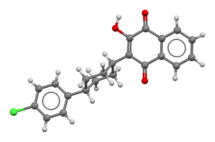Chemistry:Atovaquone
 | |
 | |
| Clinical data | |
|---|---|
| Trade names | Mepron |
| AHFS/Drugs.com | Monograph |
| MedlinePlus | a693003 |
| Pregnancy category |
|
| Routes of administration | By mouth |
| ATC code | |
| Legal status | |
| Legal status | |
| Pharmacokinetic data | |
| Elimination half-life | 2.2–3.2 days |
| Identifiers | |
| |
| CAS Number | |
| PubChem CID | |
| DrugBank | |
| ChemSpider | |
| UNII | |
| KEGG | |
| ChEBI | |
| ChEMBL | |
| Chemical and physical data | |
| Formula | C22H19ClO3 |
| Molar mass | 366.84 g·mol−1 |
| 3D model (JSmol) | |
| Melting point | 216 to 219 °C (421 to 426 °F) |
| |
| |
| | |
Atovaquone, sold under the brand name Mepron, is an antimicrobial medication for the prevention and treatment of Pneumocystis jirovecii pneumonia (PCP).[2]
Atovaquone is a chemical compound that belongs to the class of naphthoquinones. Atovaquone is a hydroxy-1,4-naphthoquinone, an analog of both ubiquinone and lawsone.
Medical uses
Atovaquone is a medication used to treat or prevent:
- For pneumocystis pneumonia (PCP),[3][4] it is used in mild cases, although it is not approved for treatment of severe cases.
- For toxoplasmosis,[5] the medication has antiparasitic and therapeutic effects.
- For malaria, it is one of the two components (along with proguanil) in the drug Malarone. Malarone has fewer side effects and is more expensive than mefloquine.[6] Resistance has been observed.[7]
- For babesia, it is often used in conjunction with oral azithromycin.[8]
Trimethoprim/sulfamethoxazole (TMP-SMX, Bactrim) is generally considered first-line therapy for PCP (not to be confused with sulfadiazine and pyrimethamine, which is first line for toxoplasmosis). However, atovaquone may be used in patients who cannot tolerate, or are allergic to, sulfonamide medications such as TMP-SMX. In addition, atovaquone has the advantage of not causing myelosuppression, which is an important issue in patients who have undergone bone marrow transplantation.[citation needed]
Atovaquone is given prophylactically to kidney transplant patients to prevent PCP in cases where Bactrim is contraindicated for the patient.
Malaria
Atovaquone, as a combination preparation with proguanil, has been commercially available from GlaxoSmithKline since 2000 as Malarone for the treatment and prevention of malaria.
Research
COVID-19
Preliminary research found that atovaquone could inhibit the replication of SARS-CoV-2 in vitro.[9] Clinical trials of atovaquone for the treatment of COVID-19 are planned,[10][11] and ongoing in United States in December 2021.[12][needs update]
Atovaquone has also been found to inhibit human coronavirus OC43 and feline coronavirus in vitro.[13]
In newer researches, atovaquone did not demonstrate evidence of enhanced SARS-CoV-2 viral clearance compared with placebo.[14]
Veterinary use
Atovaquone is used in livestock veterinary cases of babesiosis in cattle, especially if imidocarb resistance is a concern.[15]
References
- ↑ "Wellvone 750mg/5ml oral suspension - Summary of Product Characteristics (SmPC)". 28 November 2019. https://www.medicines.org.uk/emc/product/952/smpc.
- ↑ "Atovaquone Oral SUSPENSION- atovaquone suspension". 10 December 2019. https://dailymed.nlm.nih.gov/dailymed/drugInfo.cfm?setid=b31ff20a-c363-4be0-9bc0-3081c163b63c.
- ↑ "Comparison of atovaquone (566C80) with trimethoprim-sulfamethoxazole to treat Pneumocystis carinii pneumonia in patients with AIDS". The New England Journal of Medicine 328 (21): 1521–1527. May 1993. doi:10.1056/NEJM199305273282103. PMID 8479489.
- ↑ "Oral atovaquone compared with intravenous pentamidine for Pneumocystis carinii pneumonia in patients with AIDS. Atovaquone Study Group". Annals of Internal Medicine 121 (3): 174–180. August 1994. doi:10.7326/0003-4819-121-3-199408010-00003. PMID 7880228.
- ↑ "Efficacy of atovaquone combined with clindamycin against murine infection with a cystogenic (Me49) strain of Toxoplasma gondii". The Journal of Antimicrobial Chemotherapy 50 (6): 981–987. December 2002. doi:10.1093/jac/dkf251. PMID 12461021.
- ↑ Malarone: New Malaria Medication With Fewer Side-effects
- ↑ "Evidence of Plasmodium falciparum malaria resistant to atovaquone and proguanil hydrochloride: case reports". BMJ 326 (7390): 628–629. March 2003. doi:10.1136/bmj.326.7390.628. PMID 12649236.
- ↑ "Atovaquone and azithromycin for the treatment of babesiosis". The New England Journal of Medicine 343 (20): 1454–1458. November 2000. doi:10.1056/NEJM200011163432004. PMID 11078770.
- ↑ "Identification of Atovaquone, Ouabain and Mebendazole as FDA-Approved Drugs Targeting SARS-CoV-2". chemRxiv. May 2020. doi:10.26434/chemrxiv.12003930.v4. https://chemrxiv.org/articles/Identification_of_FDA_Approved_Drugs_Targeting_COVID-19_Virus_by_Structure-Based_Drug_Repositioning/12003930/4. Retrieved 20 June 2020.
- ↑ "Atovaquone and Azithromycin Combination for Confirmed COVID-19 Infection". https://clinicaltrials.gov/ct2/show/NCT04339426.
- ↑ "Atovaquone for Treatment of COVID-19". https://clinicaltrials.gov/ct2/show/NCT04456153.
- ↑ KATHRINE EMILIE KRISTENSEN (10 December 2021). "Ny forskning finder lægemiddel mod corona: 'Kan redde menneskeliv'" (in da). B.T.. https://www.bt.dk/samfund/ny-forskning-finder-laegemiddel-mod-corona-kan-redde-menneskeliv.
- ↑ "Repurposing old drugs as antiviral agents for coronaviruses". Biomedical Journal 43 (4): 368–374. August 2020. doi:10.1016/j.bj.2020.05.003. PMID 32563698.
- ↑ "Atovaquone for treatment of COVID-19: A prospective randomized, double-blind, placebo-controlled clinical trial". Frontiers in Pharmacology 13: 1020123. 2022. doi:10.3389/fphar.2022.1020123. PMID 36249792.
- ↑ "Chemotherapy against babesiosis". Veterinary Parasitology 138 (1–2): 147–160. May 2006. doi:10.1016/j.vetpar.2006.01.048. PMID 16504402.
Further reading
- "Molecular basis for atovaquone resistance in Pneumocystis jirovecii modeled in the cytochrome bc(1) complex of Saccharomyces cerevisiae". The Journal of Biological Chemistry 279 (4): 2817–2824. January 2004. doi:10.1074/jbc.M309984200. PMID 14576156.
External links
- "Atovaquone". Drug Information Portal. U.S. National Library of Medicine. https://druginfo.nlm.nih.gov/drugportal/name/atovaquone.
 |

